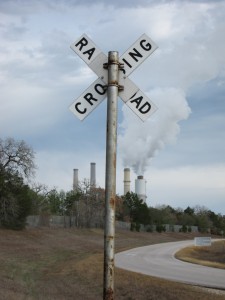After White Stallion Power Plant Canceled, Coal Faces Dark Future in Texas
The company behind what would have been the last new coal power plant in Texas, called White Stallion, is no longer pursuing the project, the company announced Thursday.
The news marks a victory for opponents of coal in Texas, notably the Environmental Defense Fund and the Sierra Club, who have worked for years to oppose the White Stallion and other coal power projects in the state. At this point, there are no longer any major new traditional coal power plants planned in Texas. All of the new projects are primarily natural gas and wind power, with some solar.
In a Thursday morning press release and email announcing the coal project would not move forward, Randy Bird, Chief Operating Officer for White Stallion, said that the plant is being suspended because of litigation costs, potential federal regulations and the low prices of natural gas.
“We have decided to ask the Travis County Court for a stay in the litigation against our … air permit through December of this year,” Bird wrote in an email. “Our air permit extension expires then. If the stay is granted, we will not commence construction while the stay is in effect.” If the plant doesn’t begin construction, it loses its air permit, which would mean having to start from ground zero, an unlikely prospect.
Phone calls and emails to Bird were not returned in time for publication. (Update: Bird is out of the country at the moment, and referred us to the press release.)
“After suffering numerous setbacks … White Stallion has finally seen the writing on the wall,” said Austin attorney Tom Weber, lead counsel for the Environmental Defense Fund, who has worked to stop the coal plant in the courts. “This is a big win for clean air in Texas and for the Environmental Defense Fund.”
“We are thrilled, this is a great day for Matagorada County,” said Bay City resident Allison Sliva, who has been working with a local grassroots group to oppose the project. “We’ve been working on this for so many years, we’re all greatly relieved that the right thing has happened. This dark cloud that has been hanging over our head has been lifted.”
In December, the Las Brisas power project in Corpus Christi, which would have used a refinery byproduct known as petroleum coke that is very similar to coal, was suspended when the company behind it announced it was going out of business. That project had its air permit revoked by a Travis County Civil Court judge last summer.
“The White Stallion plant, like the recently mothballed Las Brisas project in Corpus Christi, hopefully represents the last dying gasp of ‘new’ coal plants in Texas proposing to employ technologies from the last century,” said Jim Marston, Director of EDF’s Texas office.
The massive project would have provided 1,200 MW of power, or enough electricity to power about 240,000 Texas homes during times of peak demand. White Stallion had said as recently as December that they still planned to start construction this year because “the grid in Texas, the customers need our power.”
The development of new domestic sources of natural gas, along with tighter restrictions on new power plants, has proven a threat for coal power in Texas and across the country. One of the largest (and oldest) power plants in the state, Luminant’s Monticello in Northeast Texas, announced last fall that it would idle two of its units for half of the year in order to save money because it was having difficulty competing with low natural gas prices. That company’s coal plants are the target of a new campaign by environmental groups to wean Texas off its power plants with the highest emissions of pollutants and greenhouse gases. The state still relies on older coal-fired power plants that are criticized for their emissions for a large part of its electricity.
“Once again, without any legislative action, natural gas has continued to displace coal from the electric grid,” State Rep. Mark Strama (D-Austin) tells StateImpact Texas. “Which I think is great for the climate, great for our energy market, and good for consumers.”
With natural gas production expected to continue for some time, and the development of more wind power in the state, it’s quite possible that there will be no new coal plants in Texas from this point forward.
But while the move away from coal is welcome news to many, the decline of coal may also spell trouble for renewable energy.
“The only downside of this shift to natural gas is that it has made the challenge for renewable energy to be competitive without subsidies even greater,” Rep. Strama says. “Because any time that lower-priced natural gas power electricity displaces coal, for the same reason it tends to displace wind and solar. I think this story highlights again the need for a renewable strategy in Texas.”
To that end, Strama has advocated for state incentives and subsidies for more solar and coastal wind projects, which could help the state during hot summer days when demand for electricity is at its peak. He has filed legislation to that end, and is more hopeful that it stands a chance this legislative session.
“Let me put it this way,” Strama says. “We were really close in 2009 to passing meaningful legislation around renewables. [Then] we didn’t come very close in 2011. But this year feels a little more receptive to having a discussion.”

